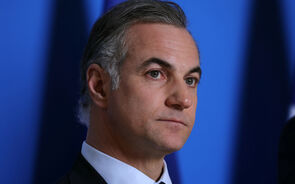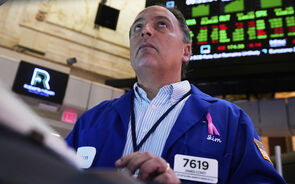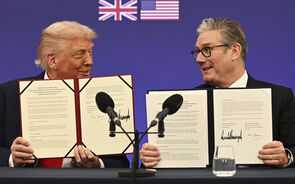Indian stock markets tumble
1 Mensagem
|Página 1 de 1
Indian stock markets tumble
Concerns about the incoming political party erase as much as $40B in market value.
May 17, 2004: 6:49 AM EDT
BOMBAY, India (Reuters) - Indian stocks plunged as much as 17.5 percent Monday in their biggest one-day fall ever as it became clear that a new leftist-backed government could be unstable and slow the pace of economic reform.
India's communist parties decided Monday not to join Sonia Gandhi's Congress-led coalition, but only support it from outside. This added to investor fears over the stability of the new government, which is likely to be sworn in Wednesday.
The rupee and bonds both fell, having been boosted over the past year by record levels of foreign investment pouring in to Asia's third-largest economy. The stock market crash wiped out as much as $40 billion in investor wealth.
The market turmoil forced the Reserve Bank of India to make an emergency statement reassuring investors it would intervene if necessary to make sure the banking system and foreign exchange markets worked smoothly. The comments helped dragged the markets off their lows, with stocks finishing down 11 percent.
"There is absolute chaos and my retail clients have lost heavily," said Herman Raja, chief executive of Bombay brokerage IL&FS Investsmart. "People are talking about foreign funds looking pull out $1-$2 billion from India."
Foreign funds have sold at least $500 million worth of Indian shares in the past week, or about an eighth of what they had invested so far this year.
"The fact that the left parties have decided not to join the government is a further blow to sentiment," Raja said.
Exchanges suspend trading
The Bombay Stock Exchange and National Stock Exchange suspended trade twice Monday morning after Bombay's benchmark index fell 15.5 percent and National's benchmark lost 17.5 percent. Both hit their lowest levels since September.
When markets resumed trade, buying by state-backed financial institutions helped pull both indexes off their lows. The main Bombay index was down 10 percent in later trading after the Reserve Bank's reassurance.
Hundreds of people, including stock brokers and dealers, piled onto the streets outside the Bombay Stock Exchange in an impromptu protest against the incoming government, screaming "Sonia Gandhi Hai Hai (Down with Sonia Gandhi)."
Traders said the sharp slide was made worse by margin calls -- in which brokers have to deposit money with the exchanges to back up transactions -- after heavy losses last week.
The rupee lost as much as 0.8 percent to 46 rupees per dollar, before recovering in afternoon trade after the Reserve Bank statement.
Monday's share price falls, on last year's best-performing market in Asia after Thailand, were led by banks and state-run firms, particularly those in line for further state stake sales.
Hindustan Petroleum Corporation dropped 10 percent, Bharat Petroleum Corporation slumped 17 percent, and Shipping Corporation of India fell 19 percent.
"Everyone is in a panic right now, and no one wants to stick their neck out," said Navin Roy, a dealer at TAIB Securities. "Everyone is of the view that the reforms process will start sliding now, and that even if the communist parties don't join the government, they will still have a say in policy," he said.
State Bank of India slid 9.1 percent and Oriental Bank of Commerce plunged 17 percent.
"Hedge funds are selling at any price. The fall today has more to do with technical positions (rather than) any political worries," said Ambareesh Baliga, vice president at Karvy Stock Broking. "Stop losses got triggered, margin calls were made."
Politicians ask for calm
Political leaders appealed for calm in the markets.
But the Communist Party of India repeated Monday last week's statement that there was no need for a ministry charged with privatizing firms.
"The left parties should not have made such statements before the formation of the new government. It has totally demoralized the market," said Sudip Kothari, a Bombay-based businessman. "I don't know how much money I've lost today, but I've never seen such a huge crash."
Privatization was one of the biggest reforms of the outgoing government, helping attract more than $10 billion in foreign equity investment into India since the start of 2003, driving the Bombay share index to 73 percent gains last year.
The rupee climbed over five percent against the dollar last year, helped by record levels of overseas money flowing into a country which was among the world's fastest-growing economies.
India's markets have been heading down for two weeks since exit polls in the country's marathon elections first signaled that the pro-reform National Democratic Alliance (NDA) would not win a majority.
May 17, 2004: 6:49 AM EDT
BOMBAY, India (Reuters) - Indian stocks plunged as much as 17.5 percent Monday in their biggest one-day fall ever as it became clear that a new leftist-backed government could be unstable and slow the pace of economic reform.
India's communist parties decided Monday not to join Sonia Gandhi's Congress-led coalition, but only support it from outside. This added to investor fears over the stability of the new government, which is likely to be sworn in Wednesday.
The rupee and bonds both fell, having been boosted over the past year by record levels of foreign investment pouring in to Asia's third-largest economy. The stock market crash wiped out as much as $40 billion in investor wealth.
The market turmoil forced the Reserve Bank of India to make an emergency statement reassuring investors it would intervene if necessary to make sure the banking system and foreign exchange markets worked smoothly. The comments helped dragged the markets off their lows, with stocks finishing down 11 percent.
"There is absolute chaos and my retail clients have lost heavily," said Herman Raja, chief executive of Bombay brokerage IL&FS Investsmart. "People are talking about foreign funds looking pull out $1-$2 billion from India."
Foreign funds have sold at least $500 million worth of Indian shares in the past week, or about an eighth of what they had invested so far this year.
"The fact that the left parties have decided not to join the government is a further blow to sentiment," Raja said.
Exchanges suspend trading
The Bombay Stock Exchange and National Stock Exchange suspended trade twice Monday morning after Bombay's benchmark index fell 15.5 percent and National's benchmark lost 17.5 percent. Both hit their lowest levels since September.
When markets resumed trade, buying by state-backed financial institutions helped pull both indexes off their lows. The main Bombay index was down 10 percent in later trading after the Reserve Bank's reassurance.
Hundreds of people, including stock brokers and dealers, piled onto the streets outside the Bombay Stock Exchange in an impromptu protest against the incoming government, screaming "Sonia Gandhi Hai Hai (Down with Sonia Gandhi)."
Traders said the sharp slide was made worse by margin calls -- in which brokers have to deposit money with the exchanges to back up transactions -- after heavy losses last week.
The rupee lost as much as 0.8 percent to 46 rupees per dollar, before recovering in afternoon trade after the Reserve Bank statement.
Monday's share price falls, on last year's best-performing market in Asia after Thailand, were led by banks and state-run firms, particularly those in line for further state stake sales.
Hindustan Petroleum Corporation dropped 10 percent, Bharat Petroleum Corporation slumped 17 percent, and Shipping Corporation of India fell 19 percent.
"Everyone is in a panic right now, and no one wants to stick their neck out," said Navin Roy, a dealer at TAIB Securities. "Everyone is of the view that the reforms process will start sliding now, and that even if the communist parties don't join the government, they will still have a say in policy," he said.
State Bank of India slid 9.1 percent and Oriental Bank of Commerce plunged 17 percent.
"Hedge funds are selling at any price. The fall today has more to do with technical positions (rather than) any political worries," said Ambareesh Baliga, vice president at Karvy Stock Broking. "Stop losses got triggered, margin calls were made."
Politicians ask for calm
Political leaders appealed for calm in the markets.
But the Communist Party of India repeated Monday last week's statement that there was no need for a ministry charged with privatizing firms.
"The left parties should not have made such statements before the formation of the new government. It has totally demoralized the market," said Sudip Kothari, a Bombay-based businessman. "I don't know how much money I've lost today, but I've never seen such a huge crash."
Privatization was one of the biggest reforms of the outgoing government, helping attract more than $10 billion in foreign equity investment into India since the start of 2003, driving the Bombay share index to 73 percent gains last year.
The rupee climbed over five percent against the dollar last year, helped by record levels of overseas money flowing into a country which was among the world's fastest-growing economies.
India's markets have been heading down for two weeks since exit polls in the country's marathon elections first signaled that the pro-reform National Democratic Alliance (NDA) would not win a majority.
"Sinto que Tania está com uma disposição hostil. Desagrada-lhe que outra coisa, que não ela, me encha. Sabe, pelo próprio calibre da minha excitação, que o seu valor está reduzido a zero. Sabe que esta noite não vim para a fecundar. Sabe que dentro de mim germina qualquer coisa que a destruirá. É de compreensão lenta, mas está a compreender…" Henry Miller, Trópico de Câncer [Livros do Brasil]
1 Mensagem
|Página 1 de 1


